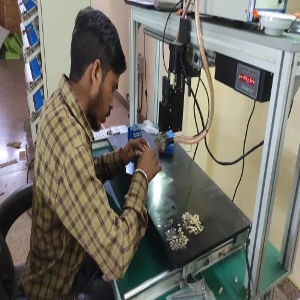Lithium-ion battery repairing services Lithium-ion battery repairing services focus on diagnosing, repairing, and refurbishing lithium-ion batteries used in various applications, such as electric vehicles, consumer electronics, and renewable energy systems. Here’s a comprehensive overview of such services: Overview of Services Battery Diagnosis Testing: Assessing the battery\'s health using specialized equipment to measure voltage, capacity, and internal resistance. Fault Identification: Identifying issues such as cell imbalance, dead cells, or internal short circuits. Repair Services Cell Replacement: Replacing defective cells within a battery pack to restore capacity and performance. Rebalancing: Balancing individual cells to ensure even charging and discharging, which prolongs battery life. Reconditioning: Cleaning and refurbishing battery contacts and connections to improve performance. Battery Management System (BMS) Repair BMS Testing: Checking the functionality of the BMS that monitors and manages the battery’s state. BMS Replacement: Replacing faulty BMS units to ensure safe and efficient battery operation. Battery Pack Rebuilding Repackaging: Rebuilding the entire battery pack, often using new or refurbished cells to increase capacity and lifespan. Re-encapsulation: Ensuring that the battery pack is securely encapsulated and insulated for safety. Data Recovery Data Retrieval: Recovering data from battery management systems or associated devices if they have become corrupted or lost. Common Applications Consumer Electronics: Smartphones, laptops, and tablets. Electric Vehicles: Cars, bikes, and scooters. Power Tools: Drills, saws, and other rechargeable tools. Renewable Energy Systems: Solar storage batteries and backup systems. Medical Devices: Mobility aids, monitoring devices, etc. Benefits of Repairing Lithium-Ion Batteries Cost-Effective: Often cheaper than purchasing a new battery. Environmental Impact: Reduces electronic waste by extending the life of existing batteries. Performance Restoration: Can restore batteries to near-original performance levels. Considerations Safety: Lithium-ion batteries can be hazardous; repairs should only be performed by qualified technicians with appropriate safety measures. Warranty: Check if repairing affects any existing warranty on the device or battery. Service Providers: Look for reputable service providers with good reviews and experience in lithium-ion battery technology. Typical Process Assessment: Customers bring in or ship batteries for assessment. Quote: After diagnosis, a cost estimate for repairs is provided. Repair: Upon approval, repairs are conducted, often within a specified timeframe. Testing: Post-repair testing to ensure the battery is functioning correctly. Return: The repaired battery is returned to the customer with information on care and maintenance. Finding a Service Provider Online Search: Look for local or online repair services specializing in lithium-ion batteries. Certifications: Ensure the service provider is certified and experienced in battery technology. Reviews: Check customer reviews and ratings for quality assurance. Conclusion Lithium-ion battery repairing services provide essential support for maintaining and extending the life of various battery-operated devices. By selecting a qualified service provider, customers can achieve significant savings and environmental benefits while ensuring their devices operate reliably.
Chat with us on WhatsApp
×
This is your website preview.
Currently it only shows your basic business info. Start adding relevant business details such as description, images and products or services to gain your customers attention by using Boost 360 android app / iOS App / web portal.

2024-10-09T06:53:23
Lithium-ion battery repairing services Lithium-ion battery repairing services focus on diagnosing, repairing, and refurbishing lithium-ion batteries used in various applications, such as electric vehicles, consumer electronics, and renewable energy systems. Here’s a comprehensive overview of such services: Overview of Services Battery Diagnosis Testing: Assessing the battery\'s health using specialized equipment to measure voltage, capacity, and internal resistance. Fault Identification: Identifying issues such as cell imbalance, dead cells, or internal short circuits. Repair Services Cell Replacement: Replacing defective cells within a battery pack to restore capacity and performance. Rebalancing: Balancing individual cells to ensure even charging and discharging, which prolongs battery life. Reconditioning: Cleaning and refurbishing battery contacts and connections to improve performance. Battery Management System (BMS) Repair BMS Testing: Checking the functionality of the BMS that monitors and manages the battery’s state. BMS Replacement: Replacing faulty BMS units to ensure safe and efficient battery operation. Battery Pack Rebuilding Repackaging: Rebuilding the entire battery pack, often using new or refurbished cells to increase capacity and lifespan. Re-encapsulation: Ensuring that the battery pack is securely encapsulated and insulated for safety. Data Recovery Data Retrieval: Recovering data from battery management systems or associated devices if they have become corrupted or lost. Common Applications Consumer Electronics: Smartphones, laptops, and tablets. Electric Vehicles: Cars, bikes, and scooters. Power Tools: Drills, saws, and other rechargeable tools. Renewable Energy Systems: Solar storage batteries and backup systems. Medical Devices: Mobility aids, monitoring devices, etc. Benefits of Repairing Lithium-Ion Batteries Cost-Effective: Often cheaper than purchasing a new battery. Environmental Impact: Reduces electronic waste by extending the life of existing batteries. Performance Restoration: Can restore batteries to near-original performance levels. Considerations Safety: Lithium-ion batteries can be hazardous; repairs should only be performed by qualified technicians with appropriate safety measures. Warranty: Check if repairing affects any existing warranty on the device or battery. Service Providers: Look for reputable service providers with good reviews and experience in lithium-ion battery technology. Typical Process Assessment: Customers bring in or ship batteries for assessment. Quote: After diagnosis, a cost estimate for repairs is provided. Repair: Upon approval, repairs are conducted, often within a specified timeframe. Testing: Post-repair testing to ensure the battery is functioning correctly. Return: The repaired battery is returned to the customer with information on care and maintenance. Finding a Service Provider Online Search: Look for local or online repair services specializing in lithium-ion batteries. Certifications: Ensure the service provider is certified and experienced in battery technology. Reviews: Check customer reviews and ratings for quality assurance. Conclusion Lithium-ion battery repairing services provide essential support for maintaining and extending the life of various battery-operated devices. By selecting a qualified service provider, customers can achieve significant savings and environmental benefits while ensuring their devices operate reliably.
2024-10-09T06:53:23

Submit Your Enquiry